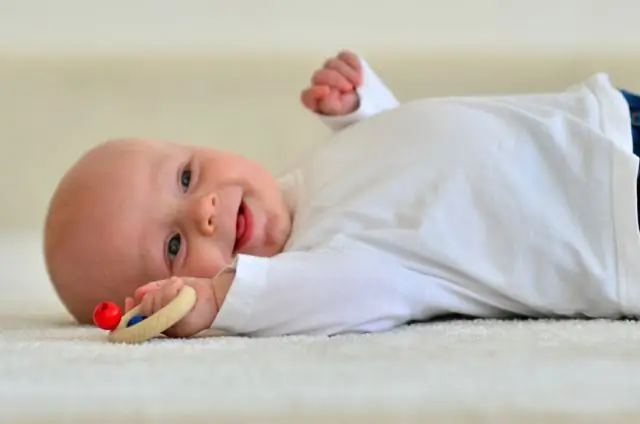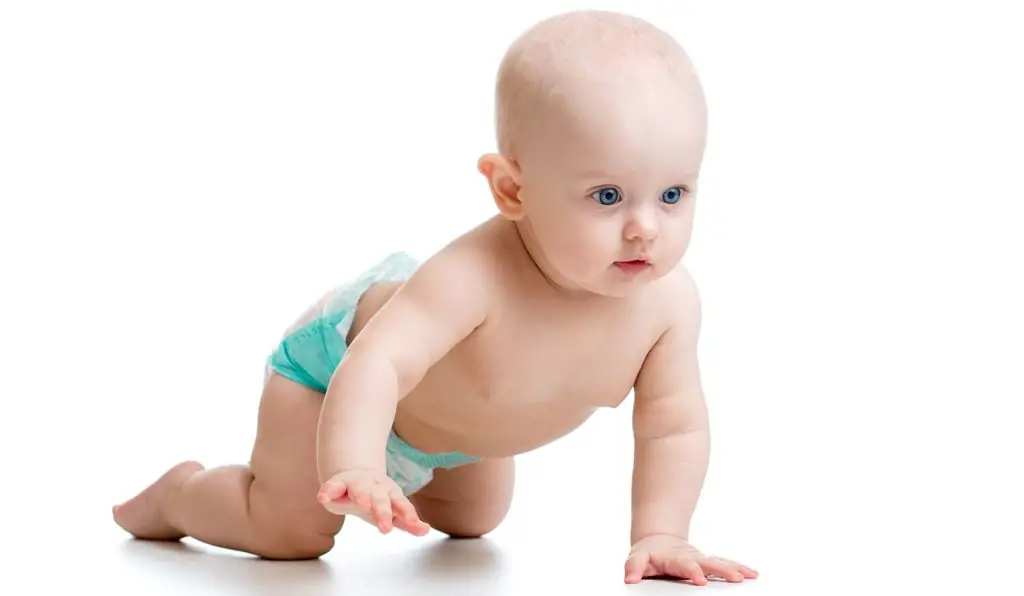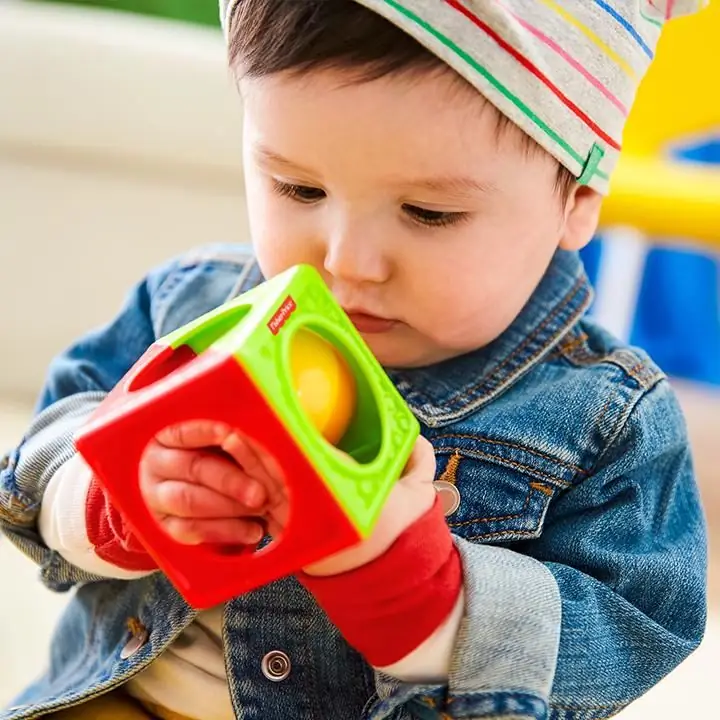2026 Author: Priscilla Miln | miln@babymagazinclub.com. Last modified: 2025-01-22 17:55:15
The mental development of a child is a complex, lengthy, continuous process that occurs under the influence of various factors. They are hereditary, biological, social. The development of the psyche is an uneven process. Conventionally, it can be divided into several stages. In our article, we will dwell in detail on the features of the mental development of children and mental processes characteristic of different age groups. Be sure to consider the factors influencing the formation of the psyche and diagnostic methods to determine the level of development of the child.
Features of the formation of the child's nervous system
The development of the psyche of the baby begins a few months before his birth, even in the womb. The fetus reacts to different sounds and other external stimuli in a certain way: it begins to behave more actively or, conversely, calms down. It happensthanks to his nervous system, which, in turn, is reflected in the psyche of the baby. These two concepts are inextricably linked.
The development of the nervous system in the first year of a child's life is rapid, several times faster than in all subsequent years of his life. So, if the brain of a newborn weighs 1/8 of the mass of his body, then by the age of one year his weight doubles. And although the pace of development slows down further, they take on a slightly different character, and are aimed more at the development of mental skills. After the birth of the baby, his brain not only does not stop growing, but also continues to actively form.
It is safe to say that the psyche is a response to the activity of the human nervous system, and the mental development of a child is a complex and vulnerable process. Initially, it is influenced by the hereditary-biological factor. Later, the social spectrum and the relationship of parents in the family are connected. For different ages, their own characteristics of the mental development of the child are characteristic. Let's dwell on age norms in more detail.
Stages in the formation of the child's psyche

As the child grows up, it develops not only physically. Simultaneously with the growth of the body, the formation of its psyche also takes place. In practice, the following stages of mental development of children are distinguished:
- Infancy: from birth to 1 year. At this stage, there is an active growth and development of the child's brain. The first year of a baby's life is characterized by its increased activity, acquisitionmotor skills.
- Early childhood: 1 to 3 years old. During this period, the development of sensory motor skills - the basis for other, more complex mental functions.
- Preschool: 3 to 7 years old. At this and the next stage, the child's actions will acquire an individual character, the personal sphere of the psyche will develop.
- Primary school age: 7 to 11 years old. By the beginning of this period, there are significant changes in the life of the child, directly related to the development of the intellectual and cognitive function of the psyche.
- Adolescence: 11 to 15 years old. This stage is characterized by the following age-related features of the mental development of children: self-esteem, communication with peers, the desire to find their place in the group.
Features of the development of the psyche in infancy

In the period from birth to one year, the development of the basic motor functions of the child occurs. Every month, the helpless baby becomes more and more active, exploring his body and motor abilities with interest. The baby learns to interact with people around him, expressing his desires and reacting to external stimuli in various ways: sounds, facial expressions, intonation.
The most significant figures for him at this stage are his parents - mom and dad. Their task is to provide the child with both physical and mental development. It is the parents who teach the baby to "communicate" with the outside world, to know it. At this stage, it is important to pay enough attention to the child, to promote the developmentgross and fine motor skills, perception of colors, shapes, volumes, textures of objects. Even with a six-month-old baby, you definitely need to practice.
Properly selected toys and regular exercises aimed at developing sensory-motor functions will stimulate the further development of the senses. But it is not necessary to require the child to comply with the rules set by the parents. While he is still too young to absorb them.
Mental development from ages 1 to 3

During early childhood, a small and defenseless baby, who recently took his first steps, becomes more independent. First, he learns to actively walk, then run, jump, study the objects around him, and talk meaningfully. But even at this stage of life, his options are still limited.
The mental development of children aged 1 to 3 years is based on imitation of adults. In order for a child to learn to do something, he must first see how his mother or father performs the same action. The child will be happy to play different games and study subjects with parents. But as soon as mom or dad is distracted and goes about their business, the baby will immediately leave the game.
The mental development of young children is inextricably linked with new discoveries. The kid begins to understand that different objects perform certain actions, for example, you can turn on the TV with the remote control, and if you press the computer button, the monitor will light up, etc. But the most important thing is that the childbegins to separate his own actions from those performed by adults. During this period, the child becomes aware of his “I”, self-esteem begins to form, self-confidence appears, and at the same time the child’s unwillingness to do what his parents say. By the end of the period, moms and dads may face what is called a three-year crisis.
Mental processes of development of a preschool child

The next stage falls just in time for the end of the crisis of three years. At this point, the child already has a certain self-esteem, feels confident on his feet and can talk more or less normally. Sometimes he even feels "on the same wavelength" with adults. That's just to understand why adults do certain things, the baby still can not. And role-playing games will help him in this. When modeling various life situations in the game, the child learns information better and develops his abstract thinking. Parents need to take note of this feature of the mental development of children.
Unlike a child of 4-5 years old, an older preschooler has his own mental characteristics. At this age, he has a great need to communicate with peers. This age period is directly related to the following mental processes of child development:
- Memory is the assimilation of new knowledge, the acquisition of useful skills and habits.
- Thinking is the development of logic, the ability to establish connections between various phenomena and their causes.
- Speech - the ability to cope with the correct pronunciation of all sounds of the native language, adjust the volume and tempo, express emotions.
- Attention is the ability to focus the mind on a particular object.
- Imagination is the ability to create various images in your head using already known facts and manipulate them.
- Perception - the development of the ability to perceive colors, shapes, sounds, objects in space and a holistic image.
The development of the mental processes presented above is the key to successful schooling.
Development of the psyche in younger students

This age period covers the gap between 7 and 11 years. At this time, the development of the intellectual and cognitive sphere takes place. It is worth noting that with the beginning of schooling, a child's life changes almost drastically. The student is required to observe discipline and daily routine, the ability to build relationships in a team, plan and control their actions.
At this stage, there are some peculiarities of the mental development of the child:
- A student over the age of seven has enough perseverance to focus on completing a task for a long time. He can calmly sit through the whole lesson, listening carefully to the teacher.
- The child knows or learns to plan his time and control actions. He does his homework in a certain sequence, and goes for a walk only after he has done all the homework.
- A child can determine the level of his knowledge and determine what he lacks in order to solve a particular problem.
The task of parents at this stage of development is to support the child emotionally, help him find new friends, quickly adapt to a new daily routine and life in a team.
Adolescent Psychology

According to most psychologists, children's age from 7 to 15 years is critical. During this period, there is a sharp jump in both the physical and mental development of the child. He is overcome by a great desire to commit adult acts, but he does not want to bear responsibility for them, to part with childish impunity. Adolescence is characterized by the following features:
- unconscious acts against parents;
- systematic violations of the boundaries of what is permitted;
- appearance of new authorities among adults and imitation of them;
- the desire to stand out from the team, from the crowd.
Depending on the model of behavior that the parents choose, the child can either find his place in the world and decide on his life position, or constantly fight the system of prohibitions, defending his desires and his own opinion. The task of mom and dad is to protect the teenager from rash acts, to find a common language with him.
Children with mental disabilities
Every person at school or in everyday life at least once encountered a child who, according to the leveldevelopment of the psyche is very different from "normal" children. Moreover, he can be physically well built, but at the same time he reads extremely slowly, does not know how to build logical chains between actions, or simply communicate with peers. Specialists often diagnose such children with mental retardation.
The whole complexity of the situation lies in the fact that parents can up to a certain point and be unaware of this feature of mental development. Children with this diagnosis are outwardly no different from their peers. But they often have problems adjusting to the team and problems with school performance.
Parents should alert the following points in the mental development of the child:
- Speech. This item includes not only problems of a speech therapy nature, but also of a lexical and grammatical one.
- Inattention. Children with mental retardation usually have increased motor activity, they are constantly distracted, unable to concentrate on any one subject.
- Violation of perception. The child does not perceive and cannot find objects familiar to him in a new environment, does not remember the names of people.
Children with mental disabilities require increased attention from parents and teachers. They need much more time and patience to study the material than their classmates.
What affects the development of the psyche?

There are the following prerequisites for mental developmentbaby:
- Normal functioning of the brain.
- Child's communication with adults. Parents, older brothers and sisters, kindergarten teachers and teachers at school are the bearers of social experience for the child. Everyone has a need for communication. And the child is no exception. Thanks to communication with adults, he learns to know himself and other people, evaluate actions and deeds. The need for communication is manifested through interest and attention to an adult, the desire to show him his skills and abilities.
- The activity of the child himself. After the birth of the baby, his motor activity does not stop, but only increases. As a child grows up, he learns to crawl, then walk, jump, run, participate in games with other children, compete, etc. That is, a normally developing child is always active.
At every stage of a child's development, and especially at the first, the family has a huge impact on the psyche, namely the atmosphere that reigns in it. If a child grows in kindness, is surrounded by attention, does not see the quarrels of parents, does not hear screams, he will have all the conditions for the realization of his physical abilities.
Diagnosis of mental development
How to understand if the child is developing as it should? To date, there are many methods to assess the level of mental development. Diagnosis of the child is aimed at studying all aspects of the psyche. The resulting data is then compared so that a holistic view of the child can be obtained. So, there are assessment methods:
- child's physical development;
- intellectual development;
- quality development of personality;
- development of individual skills and abilities.
When diagnosing, it is important to adhere to the following rules:
- When compiling a psychological profile, at least 10 tests must be used.
- Do not forget that each technique is designed for a certain age. If there are no age restrictions, the tests may differ from each other in the way information is presented.
- Never put pressure on a child, test him without a voluntary desire. Otherwise, the results of the study may be unreliable.
Recommended:
Raising a child (3-4 years old): psychology, tips. Features of the upbringing and development of children 3-4 years old. The main tasks of raising children 3-4 years old

Raising a child is an important and main task of parents, you need to be able to notice changes in the character and behavior of the baby in time and respond to them correctly. Love your children, take the time to answer all their "whys" and "what for", show care, and then they will listen to you. After all, the whole adult life depends on the upbringing of a child at this age
Can teeth be cut at 2 months: stages of child development, teething norms and opinions of pediatricians

Even those women who have not become a mother for the first time may wonder if teeth can be cut at 2 months. In some babies, signs of teething appear earlier, in others later, everything is purely individual, and any pediatrician will confirm this. It happens that teeth erupt almost imperceptibly for parents. Other children experience all the "charms" of this time. Let's talk in the article about whether teeth can be cut at 2 months, how this happens, and whether it is a pathology
Infant age of the child: features of development and norms

The baby's infancy is the period from the 29th day of his life (the first four weeks the child is considered a newborn) until the end of the first year of life. One can only wonder what significant changes occur in such a short period. Here the baby still does not know how to control his body and can tell his mother about his desires only through a cry, and by the year his skills and requirements are already practically conscious. What happens during these 12 months?
Child development per year and 4 months: important points, mental activity, growth and weight norms

This is a difficult age in which the baby becomes more inquisitive, mobile and sociable. Of course, the child wants to explore the world around him, run, jump, talk, which is not always good. Therefore, if parents give the baby as much attention as possible, they will achieve great success together
Ideal relationship between a man and a woman: the beginning of a relationship, stages and stages of relationship development, psychological comfort, trust and respect

The ideal relationship between a man and a woman: do they really exist? How to build and save them? Stages of development of relationships from the beginning of the emergence of feelings and to the state of true love. Psychological features and gender differences. How can knowledge of psychology help in building a strong union?

